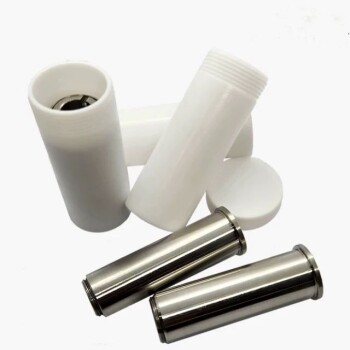Short-path distillation is a specialized technique used primarily for the separation and purification of high boiling point and heat-sensitive materials. It is widely applied across industries such as food, medicine, cosmetics, fine chemicals, and polymers. Key applications include the distillation and concentration of natural and synthetic vitamins, oils, and plant extracts; removal of solvent residues in chemical raw materials; decolorization and deodorization of natural intermediates and fatty acids; and preparation of high-boiling process materials. Its gentle separation process minimizes product loss and is ideal for heat-sensitive substances prone to decomposition, oxidation, or polymerization.
Key Points Explained:

-
Distillation and Concentration of Natural and Synthetic Compounds:
- Short-path distillation is extensively used for concentrating and purifying natural and synthetic vitamins, oils, and plant extracts. These materials often have high boiling points and are sensitive to heat, making traditional distillation methods unsuitable. The short-path method ensures minimal thermal degradation, preserving the integrity and quality of the final product.
-
Removal of Solvent Residues:
- In industries such as food, medicine, cosmetics, and building materials, residual solvents in chemical raw materials and products can be harmful or undesirable. Short-path distillation effectively removes these residues, ensuring the purity and safety of the end products. This is particularly important in pharmaceuticals and food production, where even trace amounts of solvents can be problematic.
-
Decolorization and Deodorization:
- Natural intermediates, fatty acids, and their derivatives often require decolorization and deodorization to meet quality standards. Short-path distillation provides a gentle and efficient method for removing impurities and unwanted odors without compromising the chemical structure of the materials. This is crucial in industries like cosmetics and food, where appearance and sensory properties are critical.
-
Preparation of High-Boiling Process Materials:
- Short-path distillation is ideal for preparing high-boiling process materials, especially those that are heat-sensitive. It allows for the determination of boiling ranges and the production of high-purity substances without the risk of thermal degradation. This is particularly valuable in the chemical and polymer industries, where precise control over material properties is essential.
-
Separation of Thermally Sensitive Substances:
- Many compounds decompose, oxidize, or polymerize when exposed to high temperatures at atmospheric pressure. Short-path distillation operates under reduced pressure, lowering the boiling points of these substances and enabling their separation without thermal damage. This makes it indispensable for processing heat-sensitive materials in pharmaceuticals, fine chemicals, and electronic materials.
-
Applications Across Diverse Industries:
- Short-path distillation finds applications in a wide range of industries, including:
- Food: Purification of flavors, monoglycerides, and edible oils.
- Medicine: Extraction and purification of active pharmaceutical ingredients (APIs) and natural extracts.
- Cosmetics: Refinement of plant oils and fragrances.
- Fine Chemicals: Production of high-purity chemical intermediates.
- Polymers and Plastics: Processing of polyols, polyurethane, and epoxy resins.
- Electronic Materials: Purification of heavy oils and paraffin oils used in manufacturing.
- Short-path distillation finds applications in a wide range of industries, including:
-
Minimizing Product Loss:
- Unlike traditional distillation systems, short-path distillation uses less glassware, reducing the surface area where materials can adhere and be lost. This is particularly beneficial when working with expensive or high-value substances, ensuring maximum yield and cost-efficiency.
-
Gentle Separation for High-Value Materials:
- The technique is especially suited for high-value, heat-sensitive substances prone to oxidation. Its gentle separation process preserves the chemical and physical properties of the materials, making it ideal for applications where product quality is paramount.
By leveraging these advantages, short-path distillation has become a critical tool in modern industrial processes, enabling the efficient and high-quality production of a wide range of materials across multiple sectors.
Summary Table:
| Key Applications | Industries | Benefits |
|---|---|---|
| Distillation of vitamins, oils, plant extracts | Food, Medicine, Cosmetics | Preserves integrity, minimizes thermal degradation |
| Removal of solvent residues | Pharmaceuticals, Food Production | Ensures purity and safety of end products |
| Decolorization and deodorization | Cosmetics, Food | Removes impurities without compromising material structure |
| Preparation of high-boiling process materials | Chemical, Polymer Industries | Enables high-purity production without thermal degradation |
| Separation of heat-sensitive substances | Fine Chemicals, Electronics | Prevents decomposition, oxidation, or polymerization |
| Minimizing product loss | All Industries | Reduces material loss, maximizes yield and cost-efficiency |
| Gentle separation for high-value materials | Pharmaceuticals, Fine Chemicals, Cosmetics | Preserves chemical and physical properties of heat-sensitive materials |
Optimize your material purification process with short-path distillation—contact us today to learn more!










